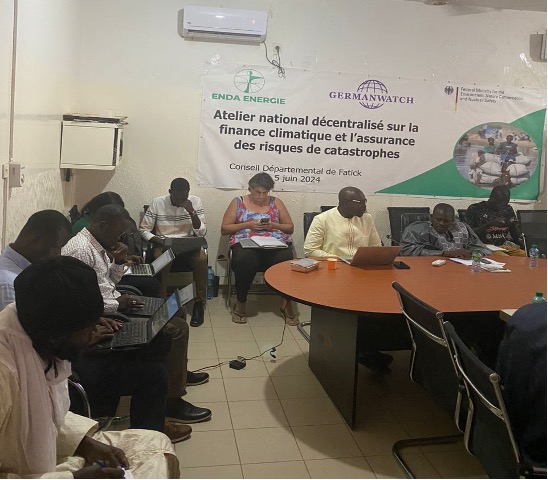
In Fatick, several umbrella organizations are calling for local initiatives to be taken into account in Senegal's CDN
The peanut basin is an area with high agricultural potential that is not immune to the vagaries of climate change. Umbrella organizations are key players at the heart of the development of the area. On Thursday, June 5, ENDA ENERGIE organized an exchange session on Financing and Insurance for Climate Disaster Risks (FARCC) at the National Council for Consultation and Cooperation of Rural People (CNCR) in Fatick.
This session, held as part of the Multi-Stakeholder Partnership Project (MAP) for the FARCC, aimed to encourage the involvement of umbrella organizations in climate action in the area.
At the start of the session, Mr. Ousmane GNING, head of ENDA ENERGIE, invited non-state actors to become actively involved in the national effort to combat climate change, particularly in decision-making regarding climate financing.
Participants, representing various umbrella organizations, civil society and state institutions, followed the presentations attentively. Mr. Abdou K. Diop, project coordinator, introduced the MAP Project by taking stock of the achievements of Phase I and setting out the ambitions of Phase II, which aim to strengthen multi-stakeholder dialogue at the regional level. The discussions revealed a strong need for information and communication concerning FARCC mechanisms, while highlighting the valorization of endogenous knowledge. Participants advocated for proven local initiatives to be taken into greater account in climate action.
The rest of the discussions was marked by the second presentation which focused on the participatory assessment of financing needs for climate loss and damage in Senegal, particularly in coastal areas.
This assessment, carried out through a documentary review and discussions with the affected coastal communities, revealed economic damages of an extent of approximately 24.877 billion FCFA, not including non-economic damages caused mainly by coastal erosion and land salinization (more than 1,221 hectares in localities such as Dionewar, Bassoul, Djirnda, Palmarin and Joal Fadiouth).
According to Omar Cissé, who presented the results of the study, it is urgent to implement large-scale projects in collaboration with the communities to better take into account their concerns.
The results of the study echoed within the umbrella organizations that are experiencing the harmful effects of climate change at various scales, including agricultural losses due to lack of water, land salinization and extreme heat. The participants' recommendations confirm the need to involve communities in the development of climate change adaptation projects.
Subsequently, Abdou K. Diop made a presentation on climate financing mechanisms, including the Green Climate Fund, whose objective is to support the most vulnerable countries in building their resilience through the implementation of climate strategies and policies.
He also presented the insurance products available in Senegal to protect farmers and livestock breeders against various climate risks.
Following the discussions and in light of the various experiences shared, the observation is the same: insurance contracts are not explicit enough and disaster victims denounce a lack of communication. Agricultural insurance products are also little known to the general public as well as climate financing mechanisms. It is noted that insurance policies remain below the expectations of communities.
The session concluded with key recommendations: improve communication around insurance products, strengthen the training of local stakeholders and involve communities more in the development of climate policies. Taking into account local initiatives and promoting endogenous knowledge have been identified as priorities in efforts to adapt to climate change.
